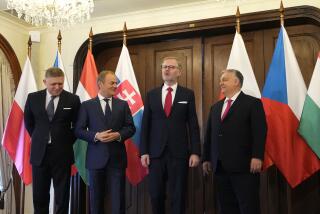East, West: Different Paths in Europe : Continent: Wealthy EC nations begin a new era of cooperation as the Soviet Union struggles with chaos.
- Share via
MAASTRICHT, Netherlands — More than two years after the fall of the Berlin Wall raised hopes of an end to the Continent’s long division, Europe is spinning further apart, not coming closer together.
Dramatic events over the last two days in Minsk and Maastricht--European cities thousands of miles and worlds apart--have underscored this reality.
Indeed, one of the few things these events share is that both present new challenges to the United States.
Here in Maastricht, amid carpeted conference rooms and complimentary Cote du Rhone, the leaders from 12 of Europe’s rich, successful democracies entered an unprecedented new era of cooperation, committing their nations to full economic and monetary union by the century’s end and a qualified political union that will almost certainly increase the power and stability of what is already the world’s largest consumer market.
Prodded strongly by France and a reunited Germany, the European Community heads of government took the dramatic step forward in what has become a steady process of economic and political integration that began with the founding of the EC 34 years ago.
“It was a success for Britain and the European Community,” declared British Prime Minister John Major of the EC summit here.
Wording in the political union treaty giving the EC a limited defense dimension symbolizes the organization’s growing self-confidence and it takes West European integration into a new area that is virtually certain to further reduce its reliance on the United States.
The development comes as the United States continues to reduce its standing forces in Europe.
“This sole fact implies that Europe is taking charge of a part of its own defense,” said French presidential spokesman Jean Musitelli. “We’re headed toward re-balancing,”
Only resistance from Britain and Italy prevented a greater Western European military commitment.
The economic and political union accords effectively strengthen the fabric of a group that also constitutes one of America’s most important single trading partners--a partner with which the United States now is locked in dispute over the crucial issue of trade subsidies.
But for Europeans, the celebrations in Maastricht were dampened by fast-moving developments farther east in a city that, although part of the same Continent, exists in a different world.
In the Belarussian capital of Minsk, announcements of another grouping of states--a Slavic commonwealth of the Russian Federation, Ukraine and Belarus--signaled the apparent, final disintegration of the Soviet Union and the birth in its place of a shaky, ill-prepared possible replacement, hard-pressed to feed itself yet armed with 27,000 nuclear warheads.
The warheads are aimed toward the West.
The Slavic commonwealth, born more out of desperation at the failure of Soviet President Mikhail S. Gorbachev’s efforts to keep the Soviet Union together, would seem to have little chance of survival, let alone stability.
In a cautious acknowledgment of the move, the EC leaders Tuesday “took note” of the three republics’ decision. “It’s unsure how it will end, but it will end badly,” commented a Finnish observer here, referring to the turmoil on his country’s eastern frontier.
A different threat lies in the region’s economic chaos, where the collapse of the Soviet system has led to a breakdown of transportation and distribution systems for delivery of such basics as foodstuffs for the tough Russian winter. Any famine would almost certainly unleash a wave of refugees westward across Europe. “The dangers are extremely high,” noted German Chancellor Helmut Kohl.
As a measure of this concern, the EC leaders agreed Tuesday to provide $340 million in emergency food aid to Russia’s two largest cities, Moscow and St. Petersburg. This grant is in addition to a $1.6-billion food aid package and $520 million in technical assistance already under negotiation.
Between the careful, tidy order of West European affluence and the turmoil of a nuclear and crumbling Soviet Union lie the former Communist states of Eastern Europe--fragile democracies, struggling with their own economic problems of adjusting to the tough, competitive world of free-market capitalism. The hope of countries like Poland, Czechoslovakia and Hungary of a swift entry into the EC have faded, and even access to West European markets has been hampered by those--led by the French--eager to protect their own prosperity.
The German shock of having to pour an estimated $90 billion to prop up the former Communist East Germany this year alone is a reflection of just how much money is needed to rebuild the onetime satellite states.
More to Read
Sign up for Essential California
The most important California stories and recommendations in your inbox every morning.
You may occasionally receive promotional content from the Los Angeles Times.










